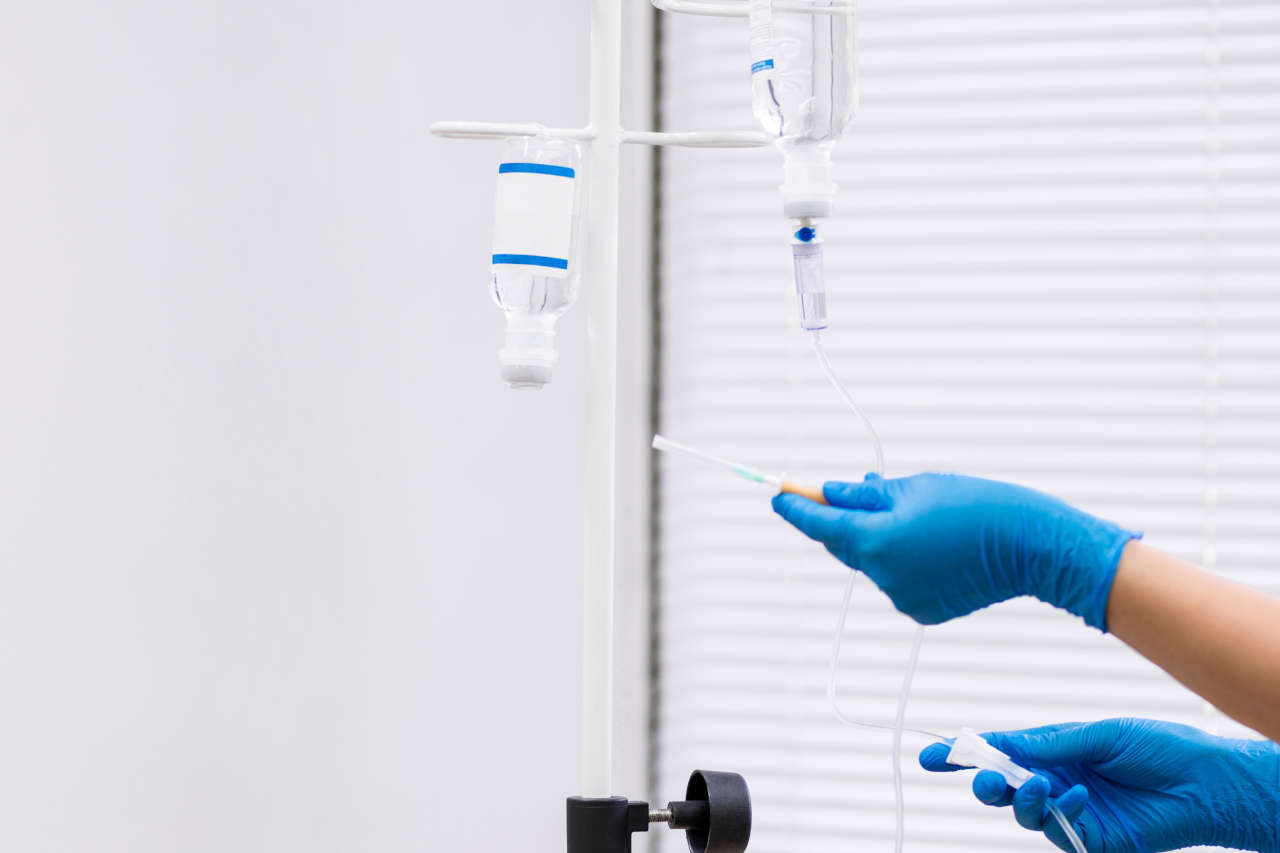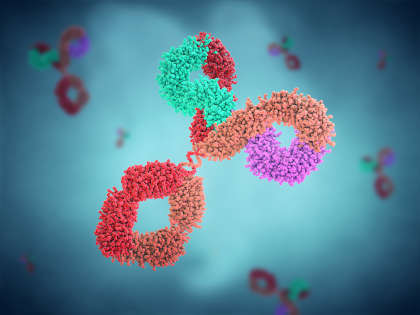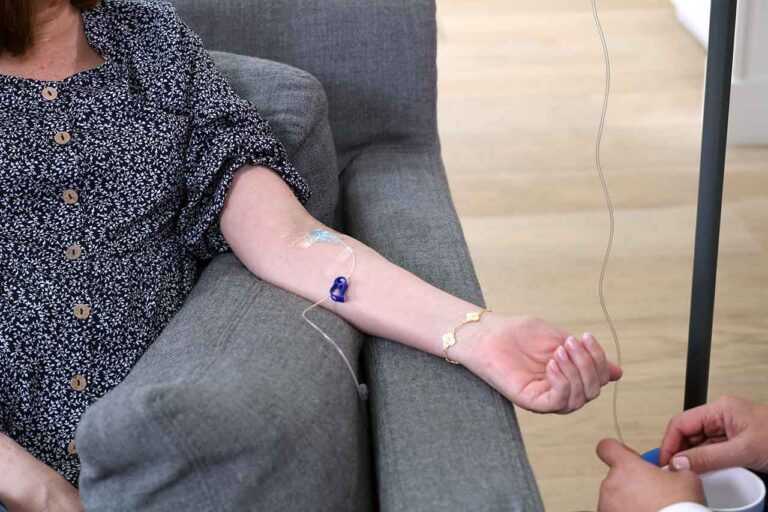
Though not usually recommended, specially formulated IVIG preparations may be an option for people with severe IgA deficiency who are unresponsive to vaccines and antibiotics.
Get IVIG Prior Authorization
Intravenous immunoglobulin, or IVIG, is a life-saving treatment aimed at restoring your immune function. It contains antibodies (infection-fighting proteins) from healthy donors.
IVIG can be used to treat several immune conditions. Although the FDA-approved conditions for each brand might slightly differ, the following are some examples of what IVIG is used to treat:
- Primary humoral immunodeficiency
- Multifocal motor neuropathy
- B-cell chronic lymphocytic leukemia
- Immune thrombocytopenic purpura
- Kawasaki syndrome
- Chronic inflammatory demyelinating polyneuropathy
- Aplastic anemia
- Infections
- Solid organ transplantation
- Multiple sclerosis
- Rheumatoid arthritis
- Polymyositis
What Is IgA Deficiency?
IgA deficiency is the most common immunodeficiency in humans. People with this condition have little or no immunoglobulin A (IgA) in their blood. IgA is an antibody (a type of protein) that helps you fight infection.
Most IgA-deficient people generally don’t have any health issues and don’t typically know they have IgA deficiency. However, some of these people are at higher risk of getting recurrent lung infections, diarrhea, allergies, or autoimmune disorders (e.g., celiac disease, inflammatory bowel disease, chronic active hepatitis).
No cure is yet available, though antibiotics may be used to treat or prevent infections. Furthermore, you can take steps to avoid catching an infection, such as washing your hands frequently and wearing a mask.
Can You Use IVIG for IgA Deficiency?
IVIG therapy is not the primary treatment for IgA deficiency. Nonetheless, it may be an option if vaccines and antibiotics don’t work.
The use of IVIG for IgA deficiency is somewhat controversial. IVIG products contain varying amounts of IgA, which can trigger potentially life-threatening allergic reactions in some IgA-deficient people. In many cases, anti-IgA antibodies mediate such reactions.
IgA Content of Different IVIG Brands
| IVIG Brand | IgA Content (µg/mL) |
| Gammaplex 10% | < 20 |
| Bivigam 10% | ≤ 200 |
| Flebogamma 5% | < 50 |
| Flebogamma 10% | < 100 |
| Gamunex | 46 |
| Octagam 5% | ≤ 200 |
| Octagam 10% | Approx. 106 |
| Panzyga | Approx. 100 |
| Privigen | ≤ 25 |
Get IVIG Copay Assistance
Speak to a SpecialistThe manufacturers of IVIG products mention on the label that these products shouldn’t be used in IgA-deficient people with anti-IgA antibodies. Likewise, they state that because these preparations contain mostly IgG and tiny amounts of IgA, IgA-deficient people are unlikely to benefit from them.
However, some studies suggest that anti-IgA antibodies may not be as crucial to causing side effects as previously thought. Similarly, IgA-containing products do not always trigger anti-IgA antibodies. Notably, there have been several studies showing the safe use of IVIG for IgA deficiency, even in people with high levels of anti-IgA antibodies [1].
Subcutaneous IG (SCIG) or IVIG preparations with low amounts of IgA are ideal for IgA-deficient people, as they carry a lower risk of serious side effects. A 2017 review noted that SCIG or IVIG for IgA deficiency is usually safe [2]. Furthermore, an old study described the paradoxical use of IgA-depleted IVIG or SCIG to treat IgA-deficient people [3].
Can You Receive IVIG for Other Conditions If You Have IgA Deficiency?
It might be possible for you to receive IVIG (even if you are IgA-deficient) for other conditions. Because IVIG is a life-saving therapy, it shouldn’t be withheld in IgA-deficient people solely because of the potential risk of serious side effects [4].
When using IVIG for IgA deficiency or other immunodeficiencies, it is best to:
- Use a product with low IgA
- Switch to SCIG if IVIG causes significant problems
- Use IVIG premedications to counteract possible reactions
- Use caution during and after treatment

What About Contraindications on the Label?
IVIG products generally list IgA deficiency as a contraindication, meaning the product can’t be used. However, contraindications for IVIG products are considered to be relative contraindications [5] and not absolute contraindications. This means IVIG for IgA deficiency may be acceptable to use if the benefits of using the medication are greater than the risks.
Can IVIG help?
Free IVIG Treatment InfoKey Takeaways
- IVIG for IgA deficiency is not typically recommended.
- IgA deficiency is usually treated with antibiotics.
- In rare cases, IVIG may be considered if vaccines and antibiotics fail to work.
- When used, it is best to use caution and use IVIG products with low IgA content.
- All IVIG products mention on their label that they are contraindicated in IgA-deficient people with antibodies against IgA and a history of allergy. However, this is not an absolute contraindication. The ultimate decision to use (or avoid) IVIG for IgA deficiency depends on whether the benefits outweigh the potential risks. This is the decision you and your provider must make together.













